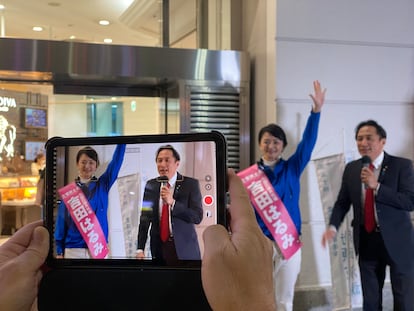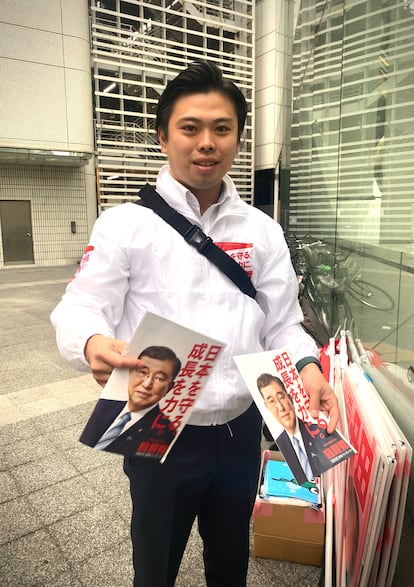This Sunday, Japan tests the resistance of the ruling Liberal Democratic Party (PLD) at the polls, the formation that has led the country with hardly any interruptions since its creation in 1955. Everything seems to indicate that, barring an electoral catastrophe, there will be a new victory for the conservative group currently at the head of the Executive. The polls, in any case, are tight, with the opposition of the center-left Constitutional Democratic Party, on the rise. The results could force unexpected pacts and subplots in the often predictable script of the Japanese elections, after a fleeting campaign that has been marked by corruption, the faltering economy, the unaffordable rise in the cost of living and the debate over the role of defense in a country that has pacifism inscribed in its constitutional DNA.
The newly appointed Prime Minister, Shigeru Ishiba, a seasoned 67-year-old politician, former Minister of Defense and Agriculture, aspires to achieve a sufficient majority for the PLD in the House of Representatives – its composition is what citizens vote for – to revalidate the mandate at the head of the Government. The Lower House is the strong body of the Diet (the Japanese Parliament), with the capacity to invest the head of the Executive. It has 465 deputies, and was dominated until now by the PLD with an absolute majority, in addition to having the support of a minority group, Komeito. But Ishiba’s party enters the elections with declining voting intention curves.
A survey published this week by the newspaper The Asahi Shimbun predicts that the PLD could lose up to 50 of the 247 seats it had, while Komeito would give up another 30, leaving the government coalition below the 233 necessary to add half plus one.
Despite his reputation for honesty, Ishiba cannot leave behind the shadow of a irregular financing scheme that broke out last year, forced the resignation of several ministersand the popularity of the then Chief Executive, Fumio Kishida, hit so hard that he finally decided to leave office in the summer. After his departure, Ishiba took the reins of the Liberal Democrats at the end of September, was inaugurated prime minister on October 1, formed a government and immediately called early elections, to take advantage of the surge in popularity. But his future is not assured. A bad result this Sunday could cause an internal crisis in the formation and the search for an alternative face to lead the Executive.
Meanwhile, the Constitutional Democratic Party (PCD) – heir to the Democratic Party that governed between 2009 and 2012, during one of the PLD’s brief interruptions in power – has continued to rise in the polls. The survey of The Asahi Shimbun It gives it up to 140 seats, 42 more than the current ones. Led by Yoshihiko Noda, another veteran of Japanese politics who served as prime minister between 2011 and 2012, the party would in any case have a very difficult time articulating a solid coalition to forge an alternative government.
They will also be the first elections since the shooting death during a rally in 2022 of former prime minister and absolute leader of the LDP Shinzo Abe, who governed the fourth economy on the planet between 2012 and 2020. His absence left the formation orphaned; After his death, cases of illegal financing began to appear that have damaged the reputation of the party.
The first point of the PLD program has to do precisely with the fight against corruption and internal regeneration to restore citizen confidence in politics. And this is of course the main flank against which the PCD’s rhetoric hits.
“I want to talk about corruption!” Harumi Yoshida, one of the leading figures of the PCD, begins her speech. He stands at the exit of the Ogikubo subway, in western Tokyo, with a microphone in his hand. It is six in the afternoon on Wednesday, there are four days left until the elections, and his words mix with the river of people returning from work. Some stop to listen to her.

In Japan (124.4 million inhabitants), candidates try to win votes in every corner of their districts. Politics takes place at street level in a campaign that has been very brief, lasting 12 days. They distribute pamphlets, they greet those who stop for a while with a bow one by one. They are small rallies organized with the help of a handful of volunteers, some banners and an amplifier. Abe was assassinated in one of these appearances, when he gave his support to another candidate.
Yoshida continues his harangue about corruption. “It is not a clean party,” he accuses the PLD. “The money that politicians have taken could be in the pockets of all taxpayers.” “Nothing is going to change!” snaps an angry young man in the audience. The candidate doesn’t even flinch; encourages putting an end to the Government; criticize the calls “Abenomics”, the measures with which Abe tried to revive Japanese finances. “They said that money fell from the top down, and we have realized that is not the case. The cost of living has only gotten worse.”
Among the few listeners, some of the citizens’ complaints are heard. Mari Kimura, 69, protests the low salaries received by elderly caregivers, a major issue in the world’s oldest country. Yuki Jimbo, a 38-year-old computer scientist who works as a political volunteer, protests the low paternity leave; He is soon going to be a father and believes that parenting aid is not enough. Japan, with one of the lowest birth rates in the world, recorded a historic low in births in 2023. The children of the generation baby boomsays Jimbo, they no longer have the standard of living of their parents. “Half of my friends don’t have children and the other half don’t have girlfriends.”
Kioko Sato, a 58-year-old career counselor, believes that the most important thing is that candidate Yoshida is against changing Article 9 of the Constitution, which enshrines Japanese pacifism. In recent years, the LDP has been taking steps toward greater military assertiveness in the face of what it sees as a growing threat from China, Russia and North Korea. It has almost doubled the Defense budget, allowed the export of lethal weapons under very specific conditions and taken steps to have the capacity to attack enemy bases. Mrs. Sato, a mother of two children, is afraid of that path: “I don’t want a war.” The harshness of the statement clashes with his contained gestures.
Next to the escalators at the Kawasaki station, a city neighboring Tokyo, Yusuke Taniguchi, 29, distributes electoral propaganda for the ruling party. He is aware that things look ugly. “The situation is very extreme, I think we are going to lose seats.” He works as secretary of Kazunori Tanaka, former Secretary of State for Finance and the Environment, who is running again as a candidate, after having been elected in nine terms. Taniguchi says they aspire to keep at least half of the 465 deputies in the lower house. One of the pamphlets that the young political apprentice spreads bears Tanaka’s face, along with a slogan: “Promote stricter laws to control political funds.”

Until now, the LDP has governed with the help of the center-right Buddhist Komeito minority party, but greater parliamentary weakness could lead to exploring new pacts further to the right, with formations more inclined to demand a review of constitutional pacifism. On this point, the volunteer gives a cryptic response: “It’s not that we want a war, what we want is to protect the country,” he says, before approaching the staircase again to distribute more pamphlets.

